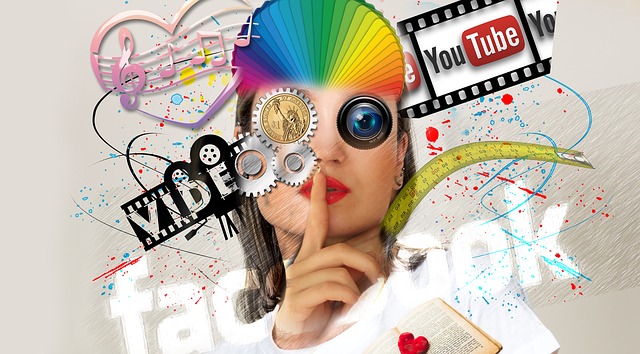
“Re-examine all you have been told.” ~ Walt Whitman
~
I turn on my laptop and the Microsoft screensaver of the day shows a vivid image of a rust-coloured fox in mid flight amid a white, snowy backdrop.
Yesterday, it showed a forest of thin, spindly trees with random branches of lush, green leaves fanning out every few feet. The day before that, it showed the washed-out, brown brick walls and slanting grey-stained roofs of a European style building looking out onto the street below. Today, the animated amber fox squints cheekily at me from the screen.
“Like What You See?” a small message at the corner of the screen asks me. “Tell us, and we’ll show you more” (indicate by clicking the heart icon).
We like to be around people, places, and things that agree with us.
We like to like.
It is human nature, after all, to seek to be more comfortable. We like to be comfortable with our beliefs, comfortable with what we know to be true.
I recently wrote an article on elephant journal about how government subsidies are contributing to the nation’s junk food habit. In it, I made the statement that organic food is better.
The topic of that article was the disconnect between the nation’s agricultural policies and our health, not organic food. Therefore, I made the statement in passing and didn’t think too much about it. I assumed this was true. Everyone knows organic is better, right?
My sister wasn’t so comfortably passive in her assumptions, though. She told me after reading it that she would argue that organic farming was not necessarily better. Although I hadn’t actually researched it, I replied and told her there were different scales of what was considered organic and some other blah blah blah. But really, I just said that organic was better because that’s what I believed, or assumed to be true, before I wrote it.
And so, I actually researched it. (Links below.)
After several hours reading up on the scientific literature around organic food/farming compared to conventional farming in terms of human consumption and environmental factors, I learnt that there are little to no scientific studies which support that organic food is better for us in terms of nutrients, anti-nutrient intake, health, or safety. There also isn’t any clear consensus as to which method is most beneficial environmentally.
The belief that organic food/farming is better for us or the environment, based on scientific research, is in fact an unfounded belief.
When I am writing for elephant journal, I have the tendency to approach the research more casually than if I were to write an academic or scientific paper due to the nature of the publication. That being said, that does not mean journalism ethics should be compromised. Facts are facts, and thorough, investigative research needs to be done where it is due.
I had, in fact (pun intended), been influenced by the organic food industry market—which is a market, just like any other—and made an assumption based on common (or unquestioned) belief.
I suppose I made that assumption unquestioningly because, well, it’s comfortable to assume.
In an apprenticeship I did with elephant, one of the skills which was emphasized in our journalism unit was that of media literacy—how to recognize credible news sources, how to be aware of reporting biases, discerning fact from fiction (or in the most current terms, “fake news”), evaluating source credibility, and the importance of consulting more than one source.
As a person who generally “doesn’t follow the news,” the journalism unit of the apprenticeship was one I found most illuminating (indeed—when one pulls their head out of the sand for the first time, reality appears glaringly bright).
I learned how mindfully consuming news and practicing healthy social media intake involved being a detective.
It involves a constant questioning and willingness to re-examine all the facts presented and being willing to change our perspective based on the facts. It involves recognizing our biases, which are perfectly okay, but formulating that bias (perspective) based on factual evidence.
In this case of organic food/farming versus conventional farming, I then decided to try on another perspective.
After speaking with a friend who practices a more holistic, naturopathic approach to health and nutrition, I researched some more radical sources, including the work of Indian scholar and environmental activist, Vandana Shiva. I read about her activist campaigns on agriculture and food—including the promotion of biodiversity, the importance of bioethics, and her fierce opposition to genetic engineering and Monsanto.
From Shiva’s viewpoint, organic was indeed “better.”
This case of organic food in terms of health and environmental benefits made me reflect upon the importance of thorough investigation when obtaining facts, forming our opinions based on factual evidence, being willing to consider different perspectives, and being open to change our opinions based on new information.
As Mr. Sherlock Holmes would describe, I had made a “capital mistake to theorize before one has data. Insensibly one begins to twist facts to suit theories, instead of theories to suit facts.”
Looking back on the original article I wrote, there are many things I would change. Having thoroughly researched and explored the topic, I feel I am in a much better position to form an opinion around what I believe about organic food.
The essence of media literacy and journalism ethics can be applied to the broader picture of human consumption. We live in a society that simply loves to consume—we consume material possessions, food, environmental resources, all we do is consume, consume, consume.
We need to learn how to exercise mindful consumption on many levels: our information consumption potentially being the most critical of all.
In a world where information is abundant, given freely—or perhaps more accurately, being bombarded at us from all sides—having the critical and investigative skills to actually consume this information is crucial.
We need to learn how not to fall victim to our Facebook newsfeed, whose algorithm is programmed to show us more of what we like (whether that be news, fake news, or cute cat videos).
We need to learn how to critically process this constant stream of information in our digital era and be able to evaluate the credibility of our sources.
We should not rely solely on the opinions and thoughts of our friends, family members, or the circle of company we most often keep, for those views may also be skewed to reflect more of what we like and prefer as well.
We need to practice constant questioning, a consultation of facts, but also critical inquiry based on our own personal experience.
We need to welcome different viewpoints and be prepared to critically examine and evaluate them. We need to be open to changing our opinions should the facts illustrate something different than our previous belief.
We need to stop hiding behind our “lols,” which we sprinkle in to our digital speech at the slightest sign of uneasiness or show of discomfort. We should instead welcome respectful, “uncomfortable” conversation and regard it as an opportunity to learn something.
We need to learn to get uncomfortable.
There’s a saying that goes something along the lines of, “If you’re comfortable, you’re not growing.”
Let’s grow.
As I look at my screensaver now—heaven forbid it should be an image which I do not particularly care for—the need to be open and receptive to seeing or hearing things which we don’t like or immediately agree with seems more pertinent that ever.
We need to learn how to become educated, inquisitive, mindful information consumers, and be unafraid to re-examine all that we have been told.
In the words of Bob Dylan, “I define nothing. I take each thing as it is, without prior rules about what it should be.”
Fact.
~
Further reading:
Organic Food: Buying More Safety or Just Peace of Mind? A Critical Review of the Literature
Are Organic Foods Safer or Healthier Than Conventional Alternatives?: A Systematic Review
Nutrition-related health effects of organic foods: a systematic review.
Organic vs. conventional farming: Which has lower environmental impact?
~
~
~
Author: Michelle Amanda Jung
Image: Pixabay
Editor: Travis May










Read 0 comments and reply